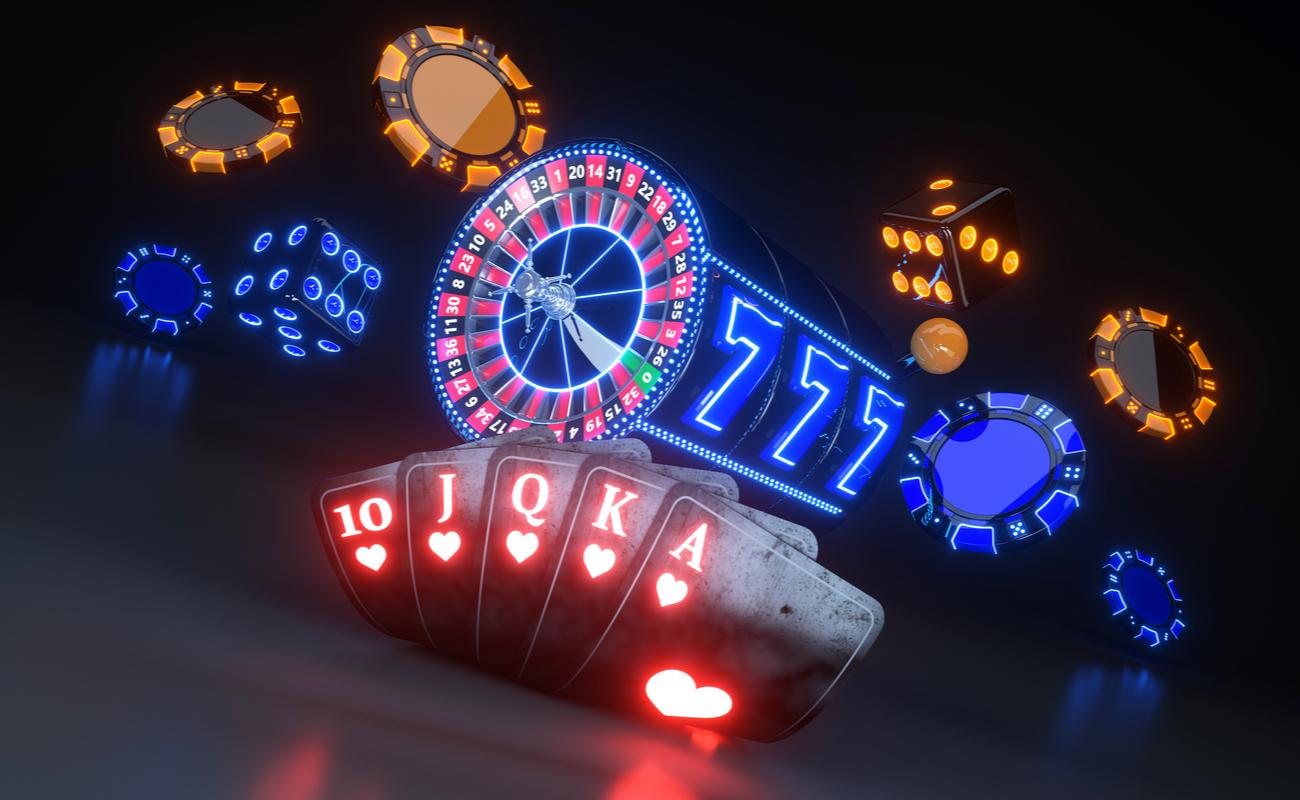
Poker prowess goes beyond just knowing the hands and being able to make educated and calculated predictions. As most of us know, it’s also a game that calls for understanding (and mastering) deception and communication. So, when you sit down at the table, it’s really important that you understand what are the terms used in poker, which is why we’ve put together a glossary of poker terms that’ll keep you in the loop while you play poker online.
The ultimate A To Z of poker
For those who are new to the game of poker, this glossary will provide you with many of the words and phrases used in poker terminology that you need to know so that you’re ready to hit the live dealer (real or virtual) tables. Or, if you’re not new to the game and just want to brush up a bit, then you might also find this list useful. After all, you might know quite a few of these terms from our general casino glossary, but there might be some that you don’t.
A
Ace in the hole – An ace that appears as one of the hole cards.
Act, or action – The player’s turn during a round of play.
Acting out of turn – When a player attempts to make a play during another player’s turn. This is sometimes done intentionally to get a read on other players (but it’s not considered good form.)
Add-on – When a player buys additional chips to add to his stack during a poker tournament.
All-in – A bet made by placing all of a player’s chips into the pot. If they don’t win the hand, they’ll be out of the game.
Angle – A borderline unethical play that is permitted at a table.
Angle shooting – Using an “angle” or unethical play to try and gain an advantage over your opponents.
Ante – A small bet that is made by players before the hand is dealt. This is sometimes done instead of blind bets to ensure that there’s a pot for players to win.
B
Baby – The lowest-ranking combination for a hand. For example, four threes would be considered a baby hand when compared to four aces.
Back into – To win the pot with an incredibly weak hand.
Backdoor – An unintentional hand made by a player.
Bad beat – To lose a hand where the winning hand was weaker to begin with.
Bankroll – The total amount of money that a player can use for betting. This can be the player’s own money or money that is provided by a funder.
Bankroll management – Knowing how to bet efficiently to maximize the number of hands you can play with your money and also knowing when to call it a day.
Big blind – The larger of the forced bets in certain types of poker games.
Big stack – The biggest stack of chips at the table in a game. Also, a stack of chips that’s big relative to the stakes of a particular game. Also known as a deep stack.
Bleed – A constant losing streak brought on by poor decision-making or bad play.
Blind – A bet that two players to the left of the dealer have to make to ensure there is money in the pot. The first player on the left is known as the small blind, while the player to the left of the small blind is known as the big blind.
Blinded out – This can happen in a tournament where you’ve lost your chip stack (by paying the blinds as they increase over time) to the point that you can’t afford another hand.
Bluff – A bet made on a mathematically weak hand to disguise play patterns and make your opponents think you’re holding a better hand than you are.
Board – The community cards that are face-up in a game.
Bounty – A reward you get for eliminating a specific player in a bounty-style poker tournament.
Button – A marker that indicates the position of the dealer at the table.
Buy-in – The amount you have to spend to get a seat at a poker table or to enter poker tournaments. You receive poker chips in exchange for your buy-in.
C
Call – In poker, calls mean matching a bet or a raise.
Cashing – Winning a share of the prize money in a tournament.
Chase – Calling a bet to see the next card when the pot odds do not merit it.
Check – Betting nothing but remaining in play.
Chip leader – The player currently with the most chips in a poker tournament.
Coffee-housing – Attempting to mislead other players about the strength of your hand.
Community cards – These are the cards that are revealed face-up on the table during the course of a game. All players can make use of these cards to form their overall best hand.
Cripple – Refers to community card games where you have a hand that’s so strong that no one can beat you. Used in the phrase “cripple the deck.”
D
Dark – Taking action without receiving the required information.
Deal – The distribution of cards in accordance with the rules of the game.
Dealer – The player whose turn it is to deal, or the official dealer for a game. In games without an official dealer, players take turns being dealer in a clockwise direction.
Deep stack – A stack of chips that’s big relative to the stakes of a particular game. Also known as a big stack.
Deuce – A two-spot card, also called a duck, quack or swan.
Donkey – A player who is seen to be weak at the table.
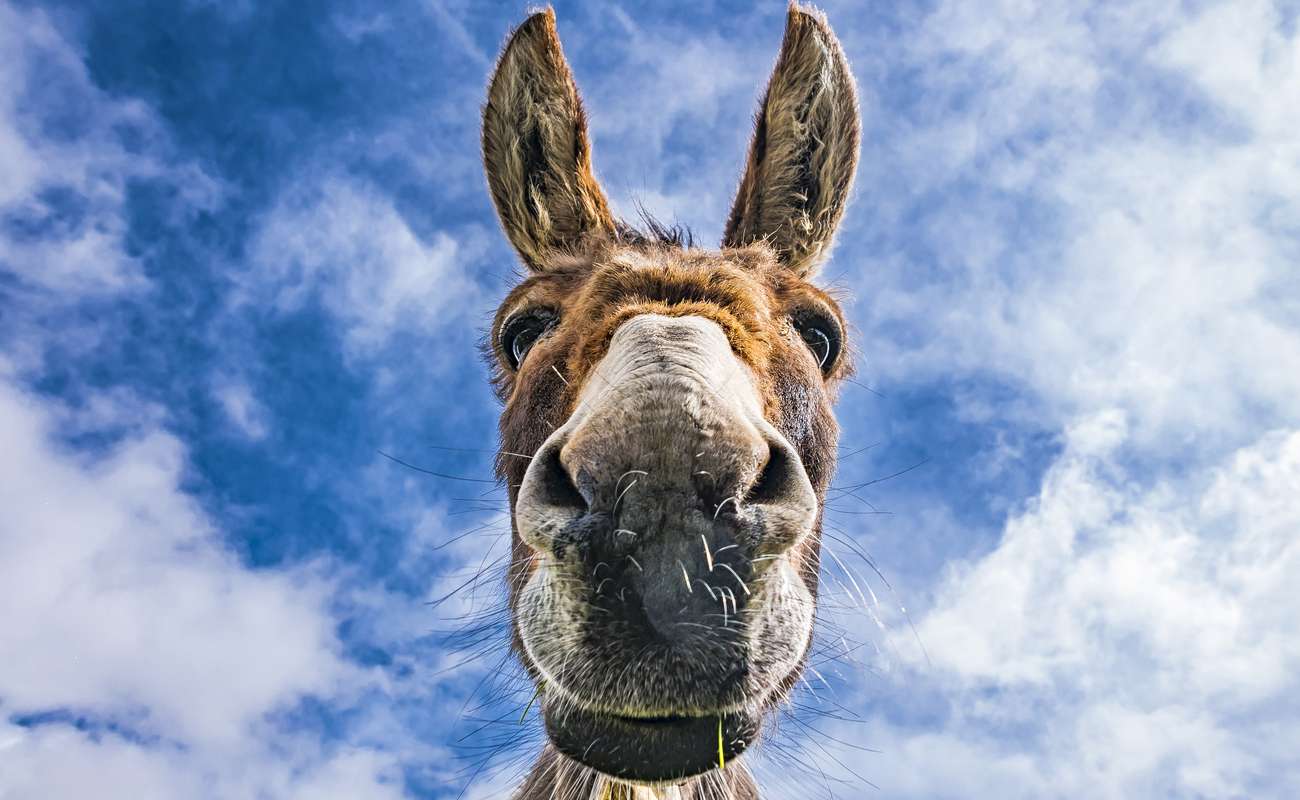
Downbet – When a smaller amount is wagered than in the previous round of betting.
Downswing – A unlucky series of games where a player loses more than expected.
Draw – This is when you discard cards in your hand in exchange for being dealt an equal number of new cards from the deck(s) in play.
Drawing dead – What you call getting no luck on the draw.
Drawing thin – Chasing a bet by drawing in the face of poor odds.
E
Early position – A player who acts first in a round of play.
Eights or better – Only hands where the eight is the highest card can win the pot.
Equity – The expected value from the current deal.
Exposed card – A card that has been accidentally revealed to players.
F
Fast – Aggressive or speedy play.
Felt – This is the traditional covering on a casino or card table (although baize is more often used.) When you lose at the poker table, some people say you’ve been “felted.”
Fifth street – The fifth and final community card is known as “fifth street.” Some poker players also use the term “river.”
Fish – Another term for a donkey, or a weak player. A fish is seen as the opposite of a shark.
Float – Betting with the intention of bluffing in a later round of betting.
Flop – The first three face-up community cards that are dealt on the table.
Fold – Forfeiting a round of play by discarding your hand.
Fourth street – The fourth of the community cards that is dealt. Also known as the “turn.”
Freezeout – A type of offline or online poker tournament where play carries on until one player has all the chips. There’s no rebuy in this type of game, so you can’t rejoin.
G
Get away – Folding a strong hand in the face of a potentially superior hand.
Going north – Sneaking additional chips onto the table during the game.
Going south – Spiriting a number of chips off the table during the game.
Grinder – A player who makes profits over a long period of consistent, conservative play.
H
Hanger – The name given to the bottom card of the deck if it sticks out from the others.
Heater – A player who has won consecutive big pots.
High card – A hand with no pair that’s ranked by the value of a single card.
High-roller – A player who competes in high-stakes games.
Hit and run – Cashing out of a game after winning a big pot. It is generally frowned upon by most players.
Hole cards – These are the two cards that are dealt face down to each player.
Hollywooding – Overreacting when cards are dealt or revealed.
Horse – A player that is bankrolled by someone other than themselves.
I
Improve – To strengthen a hand by adding or exchanging cards in certain types of poker.
Inside straight draw – Also known as a bellybuster or gutshot. This term refers to a hand where the player holds four out of the five cards needed for a straight but still needs to draw one more card to complete the hand.
In position – The player who is the last to act on the flop.
In the money – Finishing a tournament in a high enough position to earn prize money.

Insurance – A deal made between players to split or reduce a pot.
J
Joker – The 53rd card in a deck; only used in certain types of poker.
Juice – The money collected by the house.
Junk – A hand that has little expected value in the current round.
K
Kicker – A side card that does not take part in determining the rank of the hand.
Kitty – The pool of money accumulated by collecting small amounts from certain pots.
L
Lag – A style of play that is loose and aggressive.
Laydown – Choosing to fold a strong hand in anticipation of a superior hand.
Limp – To enter a pot with a call.
Level – Reference to the size of the blinds in tournament play that increase periodically.
Light – A hand that is perceived to be weak.
Lock up – Placing a chip or another type of personal effect in front of a seat to reserve it.
Loose – Playing more hands than the average for the player or the game.
M
Maniac – A loose or aggressive player who bets and raises frequently.
Mark – The player at a table that is the focus of attention.
Misdeal – A deal that was irregular or that needs to be dealt again because something went wrong.
Muck – Another term for folding a hand without revealing the cards.
Multiway pot – A pot that has multiple players competing for it.
N
Nit – A player who is cautious of taking risks and plays only strong hands.
No limit – A ruleset indicating that players are allowed to bet any or all of their chips.
Nosebleed – The highest stakes offered in a cash game of poker. Examples of a nosebleed-stake game would be $10,000/$20,000 small/big blinds or a $10 million buy-in.
Nothing – A hand that only has the possibility of ranking on a high card.
The nuts – The best possible hand in a given situation. (If you’re holding the “stone-cold nuts,” as it’s also called, you’ve emphatically got an unbeatable hand!)
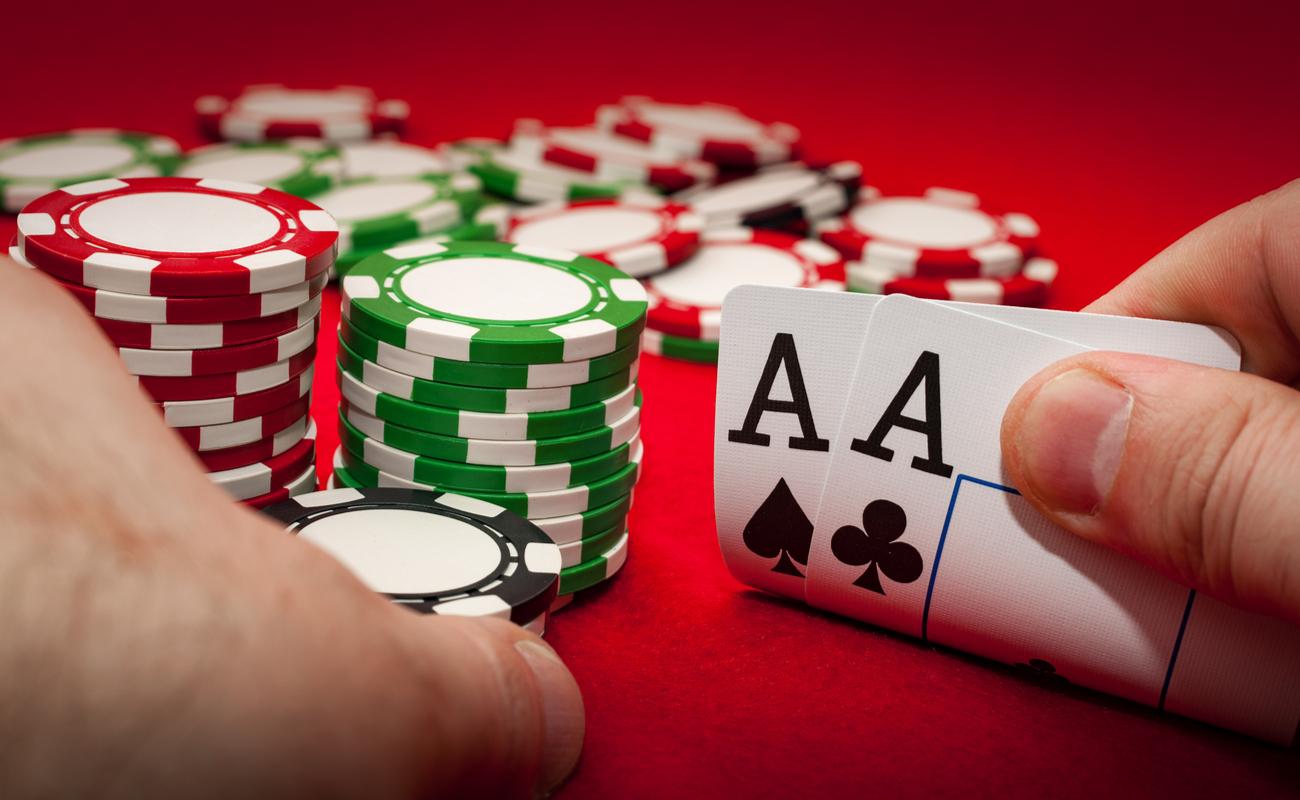
O
Offsuit – A group of cards that do not share the same suit.
Open – To bet first in a round of play.
Open limp – The first person to chip into the pot before the flop without raising.
Orbit – The full rotation of the blinds at a table.
Overbet – A bet made in a no-limit game that is larger than the pot.
Overpair – A pocket pair with a higher rank than the highest card on the table.
P
Paint – A royal card, also known as a face card.
Pat – A hand that has been completed before the end of a round of play.
Penny ante – Low stakes in a “for fun only” game.
Pocket pair – When the cards dealt to a player contain a matching pair.
Polarized – This term is used when a player’s range is split into either strong hands or bluffs.
Poker face – Have you got a good one? This is the expression on your face during hands that can reveal everything about your cards, or nothing: The choice is yours (unless you’re playing video poker, of course, where no one can see your face.)
Pot – The collection of chips from all the previous betting rounds.
Post – Making the required bet for the small or big blinds used in certain types of poker.
Q
Quads – A hand that contains four of the same kind of card.
Quartered – Winning a quarter of a pot, usually by tying in a high-low split game of poker.
R
Raccoon – Calls made in the hopes of hitting inside straight or backdoor draws.
Rag – A card that has a perceived low value.
Rainbow – Three or four cards of different suits, or betting with one chip of each color.
Raise – To place a higher bet than any of the other players during a betting round.
Rake – The cut that a casino or poker room takes as payment for hosting and managing a game.
Range balancing – Knowing what kind (or range) of hands your opponent is willing to play and the specific way they play them. This helps you judge how to play your hand against them and when they’re likely to bluff.
Read – The things you can deduce from looking at another player’s “tells” and also what their hand must be like based on how they are betting.
River – The last of the community cards dealt in a round of play. Also known as “fifth street.”
Rush – A prolonged winning streak.
S
Sandbag – A deceptive style of play where the player bets weakly with a strong hand.
Set – Three cards of the same kind where two of them are concealed in the player’s hand.
Shark – A professional card player.
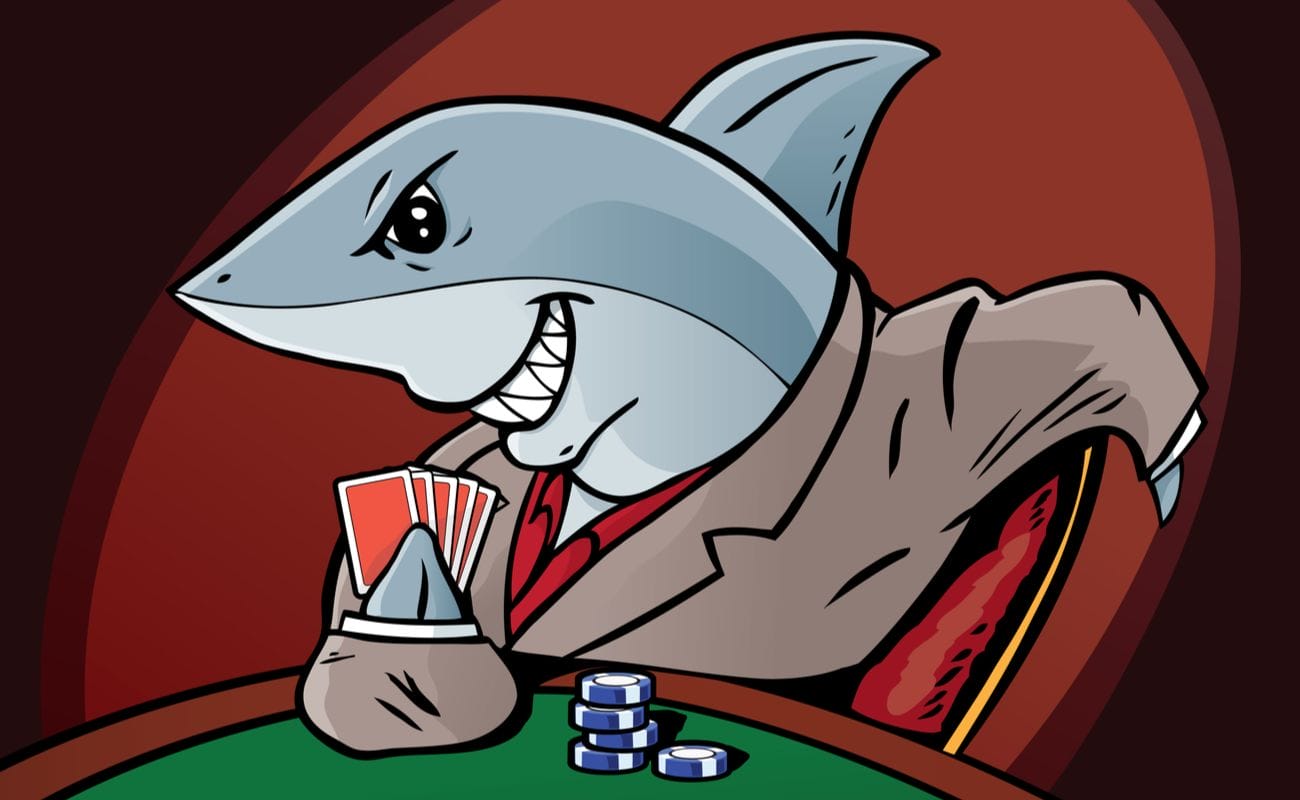
Ship it – Some players may just say “ship it” when they reveal the winning hand, to prompt the dealer to send their winnings over to them.
Showdown – The final round after betting with two players still left in the game. Both players must reveal their hands to determine a winner.
Small blind – The smaller of the forced bets in certain types of poker games.
Splashing the pot – This happens when players throw a bunch of mixed chips into the pot with all the other chips and they “splash” and become disorganized. (People see it in movies and think that it’s ok to splash the pot, but it’s considered bad etiquette.)
Stack – The total amount of money (often represented as a “stack” of casino chips) that a player has in play.
Sucking out – Drawing a better hand on the flop/turn/river, despite being the underdog in the previous betting round.
T
Tag – A style of play that involves betting on a small number of strong starting hands.
Tank – Spending a lot of time on a decision.
Tell – Body language habits or clues that give you an idea of what another player is thinking or feeling (they’ll be watching all of yours, too!)
Tilt – The behavior of a player during emotional or mental confusion, resulting in poor play. A player is often “tilted” when they’re on a losing streak.
Turn – The turn, turn card or “fourth street” is the fourth of the five community cards that is dealt.
U
Underdog – The player at the table with the hand that has the least chance of winning.
Under the gun – The player who must make the first play after each round of betting. This player is the first one to have the choice to call, raise or fold and will be the one to the left of the big blind in the first round.
Up the ante – An action taken to increase the stakes of the game.
Upcard – A term for a card that is played face-up.
V
Value bet – A bet made by a player in the hopes that it is called by the rest of the table.
Variance – The statistical measure of how much results differ from expectations.
Vigorish – Also called VIG, is the percentage of commission taken by the casino.
W
Wake up – The discovery of a strong starting hand after there has already been action.
Wash – A method of shuffling the deck by spreading them on the table.
Wild card – A card in certain types of poker that can represent the value of another card.
Whale – A player with a large bankroll. They aren’t very good at the game and are seen as easy targets by more skilled players.
TIME TO HIT THE TABLES
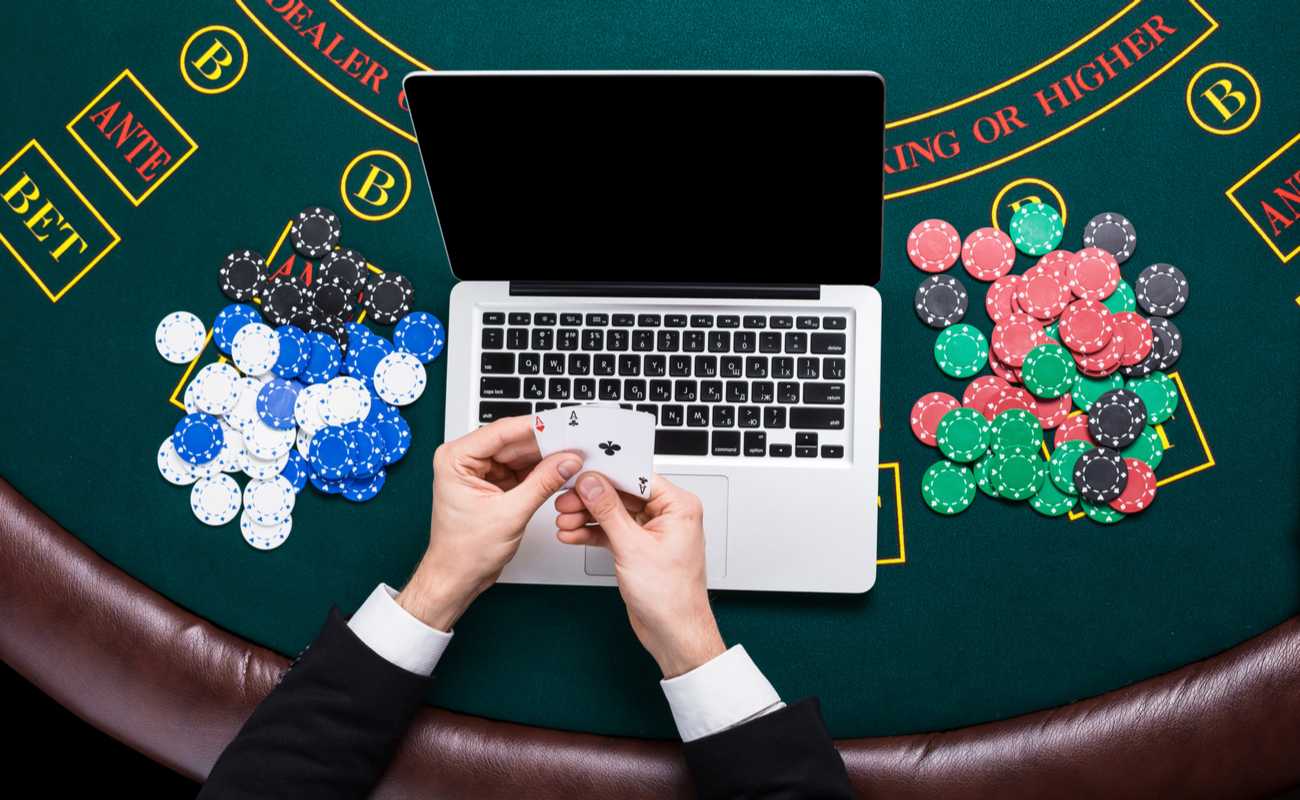
Now that you can communicate more effectively with the sharks and whales at the tables with all this poker lingo, why not take your new vocabulary for a spin with some real poker online? Or, if you’re in the mood for something else, why not try our other online casino games such as live dealer games, slots (we also have an ultimate slots glossary) and video poker online.
Register at Borgata Online Casino for some of the best online poker games available, as well as other thrilling gambling games!
